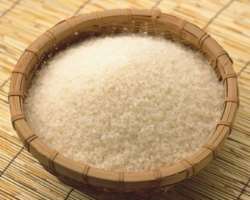The new fiscal policy on rice - The Sun

The new fiscal policy on rice recently approved by the Federal Government as part of efforts to boost local production and investment in the rice value chain is a welcome initiative that should discourage unbridled importation and smuggling of rice into the country. It will also significantly boost food security. Currently, Nigeria is a net importer and major consumer of rice in Africa. Statistics from the Federal Ministry of Agriculture show that Nigeria spends N356 billion yearly on rice importation.
The rice policy, which has already been endorsed by President Goodluck Jonathan, is a review of the 2013 policy on rice importation that provided for 100 percent levy on imported rice, and 10 per cent Customs duty. Under the new policy, importation of husked brown and semi-milled or wholly milled rice will henceforth attract 10 percent duty rate with an additional 60 percent levy.
However, importers with verified backward integration projects like rice farms and milling capacity will now pay 10 percent duty and 20 percent levy. To ensure compliance with the new policy, the Federal Government, in a circular dated June 16, 2014, advised all importers with shiploads of rice awaiting clearance at the ports to clear their consignments upon the submission of a letter of indemnity to the Nigeria Customs Service (NCS). The indemnity, according to the Coordinating Minister for the Economy and Minister of Finance, Dr. Ngozi Okonjo-Iweala, is to allow all importers of rice to clear their consignments without attracting further demurrage.
For this policy to succeed, it needs sincerity of purpose and strong commitment of those responsible for its enforcement. Rice is an important staple food in Nigeria. It, therefore, needs adequate support for local production to meet consumers' needs.
We believe that with sufficient support in terms of fertilizers, agricultural machinery and improved seedlings, rice importation with its attendant drain on our foreign reserves can be reduced to the barest minimum. Nigeria can then, in a few years, achieve food security in rice production and reduce the rate of smuggling of the product into the country.
According to statistics, over three million tonnes of rice are currently smuggled into Nigeria every year. Nigeria should emulate countries that were once net importers of rice but have now achieved local rice sufficiency.
A good example of these countries is Indonesia, which has stopped rice importation, as it has reportedly been producing three million tonnes of rice per annum in the last three years. Also, China has achieved an astonishing 150 million tonnes per annum local rice production. One of the ways these three countries achieved these feats was through a significant reduction on duties and other ancillary levies imposed on local producers.
It is in this connection that we think that the 10 percent duty rate and 20 percent levy on importers with rice farms is high. The levy should be much lower. This is what governments of neighbouring countries such as Benin Republic and Cameroun have done to encourage local production and investment in the rice value chain. Rice farmers in states like Ebonyi and Ogun, who are known for production of local brown rice known as Fadama and Ofada respectively, have the capacity to meet a substantial percentage of the national requirement. What they need is sustained government policy support.
Altogether, we urge government to address the problems inhibiting local rice production.These include cost of credit, policy instability, dearth of necessary equipment and agro-chemicals, taxes and tariffs (both legal and illegal), decaying infrastructure, high interest rates and corruption-ridden-fertilizer distribution channels.
